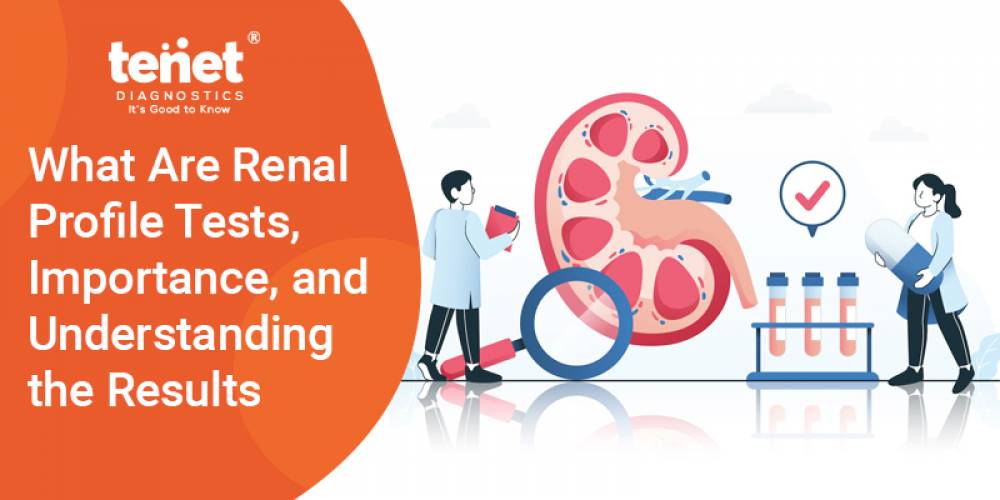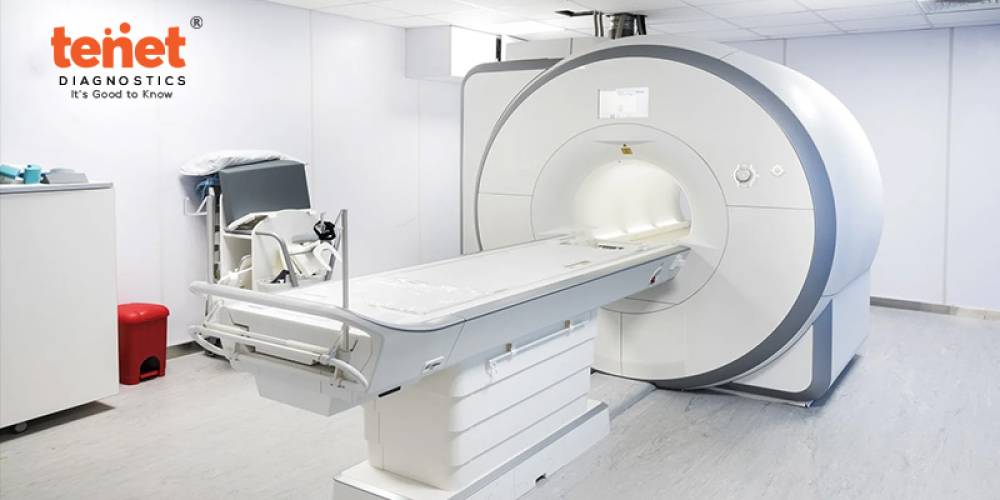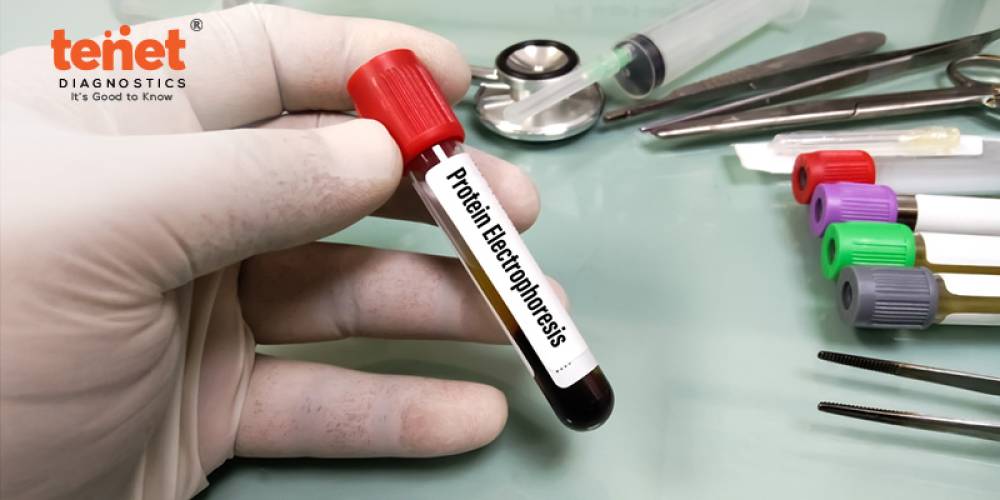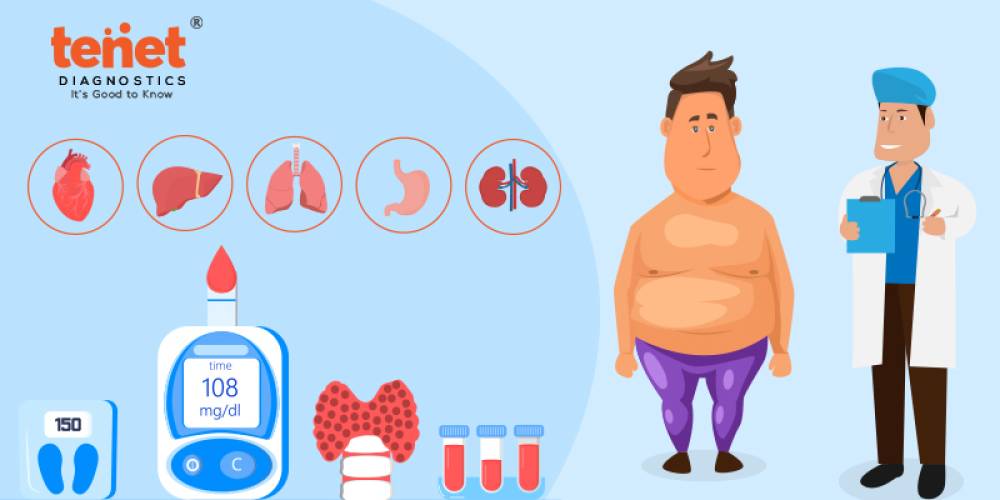Urine or blood tests, kidney function tests, are used to assess how effectively your kidney's function. A lot of these tests gauge GFR or glomerular filtration rate. The Renal profile tests how well your kidneys remove waste from your body.
What is a Renal Profile Test?
A renal profile test is a series of exams to evaluate a person's kidney's functional state. Different tests are used for other purposes depending on the patient's needs and the doctor's prescription. The renal profile (kidney function) test generally seeks to analyze the patient's electrolyte levels, blood urea nitrogen (BUN) and creatinine levels, and GFR. The doctor can determine whether or not your kidneys are functioning effectively using these criteria. Samples of blood or urine might be drawn for the test. With few to no side effects, the tests can screen for or monitor a variety of renal illnesses. For undergoing Renal function tests in Hyderabad, visit Tenet diagnostics.
Why is the Renal Test Important?
Some diseases, such as diabetes and high blood pressure or hypertension, impact the kidneys' effectiveness. Your healthcare professional may use kidney (renal) function tests to monitor one of these conditions if you have it.
If you experience symptoms that point to potential renal abnormalities, you could also require a kidney function test. These signs could consist of the following:
- Hematuria or blood in the urine.
- Urination that hurts or dysuria.
- Urge to urinate frequently.
- Issues in the beginning to urinate.
If a person has had kidney problems or is receiving treatment for kidney injury or disease, the renal profile test can also be used to track how their kidneys are doing. The test assists in determining how well the treatment are functioning.
Although a Renal Profile Test is primarily used to identify any kidney illness or damage, it can also be used to track the body's reaction to ongoing treatments or any current renal issues. It is always advised to visit a healthcare expert with the test report because various factors might alter the findings of the renal profile test. They will be qualified to interpret the results correctly and, if necessary, administer any additional testing or treatment.
Parameters Tested in a Renal Test are:
1. Albumin:
Albumin is a protein primarily present in the blood, yet under normal circumstances, a very small quantity of the protein can also be found in urine. A kidney-related problem may be current if a person has elevated levels of albumin in their urine.
2. BUN:
Urea nitrogen is a consequence of the breakdown of dietary proteins and is measured as BUN (blood urea nitrogen). Poor renal function is typically the cause of elevated BUN levels.
3. BUN-to-Creatinine Ratio:
When the blood supply to the kidneys is severely decreased, the result is typically a BUN to creatinine ratio (BUN: creatinine) that does not fall within the normal range.
4. Calcium:
The amount of calcium in the body is a key indicator of how well the kidneys are working and how much calcium they are excreting. Kidney stones can develop when the body's calcium levels rise.
5. Carbon Dioxide:
In the human body, the kidneys and lungs maintain a balance between the amounts of carbon dioxide, bicarbonate, and carbonic acid. When these concentrations begin to rise in the blood, it is a red flag for poor kidney health.
6. Chloride:
In the human body, chloride plays a key electrolyte role in controlling fluid balance and preserving the acid-base equilibrium. In kidney illnesses like tubular acidosis, the blood's level of chloride begins to rise.
7. Creatinine:
A waste product created by the body's muscles is creatinine. The kidneys excrete a lot of creatinine when they are working correctly. Increased amounts of this waste product in a person's body can be a worrying sign that the kidneys are not correctly filtering the blood. Severe renal problems can develop when the body's level of creatinine increases.
8. Phosphorous:
Phosphorus is a crucial mineral that supports bone development, muscle and neuron health, and energy production. But having too much phosphorus in the body can also have negative effects on your health. The kidneys regularly remove the additional mineral levels as they filter the blood, but if they become damaged, the bloodstream accumulates the mineral.
9. Potassium:
Potassium is another electrolyte that aids in maintaining the body's water balance and enhances nerve impulses and digestion. Potassium levels outside the normal range are a sign of kidney disease.
10. Sodium:
The human body needs sodium as an electrolyte to regulate blood pressure and volume and keep fluid balance. Additionally, it promotes healthy neurons and muscle function. Increased sodium levels are a sign of kidney disease because the body can't get rid of the additional sodium, which results in elevated sodium levels.
What if you happen to have a kidney disease?
Kidney illness is curable. The earlier you receive medication to help postpone or avoid kidney failure, the sooner you know you have kidney disease. Heart disease may be avoided by treating renal illness.
The goals of treatment include:
- Stop your GFR from declining.
- Reduce your urine albumin levels.
Final words:
In conclusion, renal profile examinations are essential for determining kidney health and function. These tests offer valuable data that aid medical practitioners in diagnosing, observing, and managing various renal disorders. For appropriate diagnosis, treatment planning, and patient care, it is essential to comprehend the significance of renal profile tests and how to interpret their results.
Serum creatinine, blood urea nitrogen (BUN), estimated glomerular filtration rate (eGFR), and electrolyte values like sodium, potassium, and chloride are frequently measured in renal profile examinations. These tests aid in determining the kidneys' capacity for filtering and excreting waste products, as well as their electrolyte balance and acid-base condition.
Beyond diagnosis and monitoring, it's important to recognize the significance of renal profile testing. These tests also guide treatment choices, such as managing fluid and electrolyte balance, adjusting medication dosages based on renal clearance, and safeguarding kidney function.
In conclusion, renal profile tests are crucial for determining kidney function and identifying abnormalities. Healthcare providers must understand the importance of these tests and be able to interpret the results correctly. With the help of this understanding, kidney problems may be managed effectively, treatment strategies can be optimized, and patients have better outcomes for their general health and kidney function.
Frequently Asked Questions:
What is the purpose of the renal profile?
To assess the kidneys' efficiency, renal profile tests are employed. Your GFR, electrolyte levels, BUN, and creatinine levels are all revealed to the doctor by the test results. These levels are evaluated by the doctor to see how well the kidneys are working. Both urine and blood samples are used in these examinations.
What occurs throughout a renal profile?
Typically, a laboratory worker would take blood and urine samples from you during the examination. To obtain a sample of your urine, you can be requested to urinate into a container. For the blood tests, the lab professional will insert a needle into your upper arm and extract blood. There are no additional preparations needed.
Are tests on the renal profile necessary to be fasted?
Yes, a patient will typically be told not to eat anything for 8 to 12 hours before a renal profile test. The findings of these tests can therefore be relied upon to identify and treat your urinary issues. Typically, there are no additional requirements for the test itself. Within 1-2 days, the test results can be obtained.







